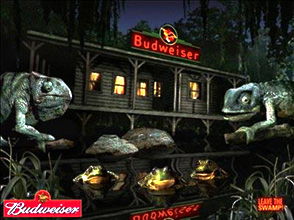

Our
mission is to reduce the number of injuries and deaths due to
injuries,
through prevention, improved trauma care, and improved rehabilitation.
December
3, 2003
Is Big Alcohol Litigation Next?

Q: Since litigation has been used to
address tobacco damage, can it also be used to address alcohol damage?
A: The states’ tobacco lawsuits provide us with important
lessons for alcohol. The
greatest benefit of the tobacco litigation was not
any of the legal awards and settlements, but public health gains made
possible by court supervised discovery of industry documents. That documentation
showed that the industry aggressively promoted tobacco to children while
hiding the facts about addiction and disease.
As a result, public perceptions of the industry turned sour, giving
lawmakers the necessary public support to promote tobacco control
legislation including increased tobacco taxes and indoor smoking bans.
The
similarities between tobacco and alcohol promotion are clear.
Both products are aggressively marketed to children.
Both cause disease and death. In
addition to long-term disease, alcohol use can also result in immediate
damage: unintentional injuries, drunk driving collisions, domestic violence,
and crime, thus creating huge criminal justice as well as public health
costs.
One
major tobacco litigation success sent Joe Camel packing through the
California consumer protection lawsuit.
The complaint had cited articles in the Journal
of the American Medical Association that demonstrated the link between
the cartoon ads and huge increases in Camel's underage market share.
RJ Reynolds (Joe’s maker) was committing fraud by promoting an
illegal act: selling its product to underage youth.
This strategy may show promise in the alcohol arena as well.
The alcohol industry places its youth-oriented print, television, and
radio commercials in media with large underage audiences.
The industry is unjustly
enriched by illegal sales to minors which make up 15 to 20 percent of
alcohol market share.
After
years of largely unsuccessful personal injury and “failure to warn”
alcohol suits, the first alcohol litigation–based on consumer fraud–has
just been filed in the District of Columbia.
While alcohol damages related to underage drinking are
well-documented, proving industry fraud may be difficult.
Consumer attorneys will face substantial legal hurdles, the first of
which is to survive summary judgment so that they can gain access to
industry internal memoranda.
Litigation
alone won't solve the many problems of underage drinking.
However, judging from the states’ tobacco lawsuits, litigation may
provide an important tool for uncovering the darker side of alcohol
marketing. And ultimately, it
could give policymakers the support they need to translate legal remedies
into sound public health alcohol policies.
Resources:
Center on Alcohol and Youth marketing
www.camy.org
Center
for Science in the Public Interest
www.cspinet.org
Tobacco Control Resource Center and Tobacco Products
Liability Center
http://www.tobacco.neu.edu/
UCSF
Tobacco Archives
http://www.library.ucsf.edu/tobacco/
Alcohol
Industry Sued for Marketing to Children
Lawsuit Tries Similar Legal Strategy as Tobacco Case
http://www.adage.com/news.cms?newsId=39277
Alcohol
Industry Faces Suit Alleging Marketing to Teens
http://bradenton.com/mld/bradenton/business/7359829.htm
Alcohol
Advertising Alert
http://marininstitute.org/alcohol_industry/ad_alert.htm
This TF news story is a based on Implications of Tobacco Litigation for Alcohol Policy, Amy N. Fairweather, JD, James F. Mosher, JD, presented Nov. 17, 2003, APHA annual meeting. Preparation of this paper was assisted by a grant from the Robert Wood Johnson Foundation Substance Abuse Policy Research Program.
 |
 |
|---|